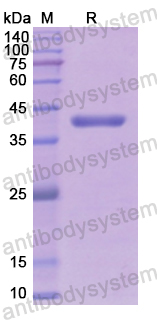Catalog No.
YHC12401
Expression system
E. coli
Species
Homo sapiens (Human)
Protein length
Thr9-Tyr364
Predicted molecular weight
40.86 kDa
Nature
Recombinant
Endotoxin level
Please contact with the lab for this information.
Purity
>90% as determined by SDS-PAGE.
Accession
P05062
Applications
ELISA, Immunogen, SDS-PAGE, WB, Bioactivity testing in progress
Form
Lyophilized
Storage buffer
Lyophilized from a solution in PBS pH 7.4, 0.02% NLS, 1mM EDTA, 4% Trehalose, 1% Mannitol.
Reconstitution
Reconstitute in sterile water for a stock solution. A copy of datasheet will be provided with the products, please refer to it for details.
Shipping
In general, proteins are provided as lyophilized powder/frozen liquid. They are shipped out with dry ice/blue ice unless customers require otherwise.
Stability and Storage
Use a manual defrost freezer and avoid repeated freeze thaw cycles. Store at 2 to 8°C for frequent use. Store at -20 to -80°C for twelve months from the date of receipt.
Alternative Names
ALDOB, Liver-type aldolase, Fructose-bisphosphate aldolase B, ALDB
Identification of protein biomarker candidates associated with organ-specific immune-related toxicity and response to management by plasma proteomics., PMID:40510441
LC-MS/MS proteomics identifies plasma proteins related to cognition over 9-year follow-up., PMID:40469059
Integrating network pharmacology, quantitative transcriptomic analysis, and experimental validation revealed the mechanism of cordycepin in the treatment of obesity., PMID:40438591
Serum proteomics of adults with acute liver failure provides mechanistic insights and attractive prognostic biomarkers., PMID:40242314
Gene expression profile in ulcerative colitis patients: FOXO4, ALDOB, SLC26A3, SOD2 genes as potential biomarkers., PMID:40153227
Glucose and Insulin Differently Regulate Gluconeogenic and Ureagenic Gene Expression., PMID:40024748
In vitro protein expression profile of cultivated muscle cells from Labeo rohita., PMID:39966484
Fructose-induced progression of steatohepatitis involves disrupting aldolase B-AMPK signaling in methionine adenosyltransferase 1A deficient mice., PMID:39922455
ALDOB suppresses the activity of CD8+ T cells in colorectal cancer via the WNT signaling pathway., PMID:39909069
Targeting FDFT1 Reduces Cholesterol and Bile Acid Production and Delays Hepatocellular Carcinoma Progression Through the HNF4A/ALDOB/AKT1 Axis., PMID:39899681
Screening of differential gene expression patterns through survival analysis for diagnosis, prognosis and therapies of clear cell renal cell carcinoma., PMID:39348357
SUV39H1 Regulates Gastric Cancer Progression via the H3K9me3/ALDOB Axis., PMID:39302619
Polymeric immunoglobulin receptor promotes Th2 immune response in the liver by increasing cholangiocytes derived IL-33: a diagnostic and therapeutic biomarker of biliary atresia., PMID:39288533
Ketogenic diet reshapes cancer metabolism through lysine β-hydroxybutyrylation., PMID:39134903
Fructose-1, 6-Bisphosphate Aldolase B Suppresses Glycolysis and Tumor Progression of Gastric Cancer., PMID:39068380
CBX4 suppresses CD8+ T cell antitumor immunity by reprogramming glycolytic metabolism., PMID:38994031
Hepatic glucokinase regulatory protein and carbohydrate response element binding protein attenuation reduce de novo lipogenesis but do not mitigate intrahepatic triglyceride accumulation in Aldob deficiency., PMID:38972375
Proteomic and metabolomic profiling of plasma predicts immune-related adverse events in older patients with advanced non-small cell lung cancer., PMID:38827402
Multi-omics analysis of a case of congenital microtia reveals aldob and oxidative stress associated with microtia etiology., PMID:38802922
MRTO4 Enhances Glycolysis to Facilitate HCC Progression by Inhibiting ALDOB., PMID:38778508
Effects of foetal size, sex and developmental stage on adaptive transcriptional responses of skeletal muscle to intrauterine growth restriction in pigs., PMID:38605102
Cross-sectional and longitudinal analyses of urinary extracellular vesicle mRNA markers in urothelial bladder cancer patients., PMID:38514751
Circulating biomarkers of the CS4P and CLIP scores are not altered in a pig model of acute cardiogenic shock and additional short-term circulatory support., PMID:38182061
Co-Analysis of Serum and Urine Differentially Expressed Proteins in Mucopolysaccharidosis Type I., PMID:38164767
Dihydroxyacetone phosphate accumulation leads to podocyte pyroptosis in diabetic kidney disease., PMID:38063077
ALDOB/KAT2A interactions epigenetically modulate TGF-β expression and T cell functions in hepatocellular carcinogenesis., PMID:38051951
Polyacrylonitrile microfibers pose a significant threat to the early-stage survival of zebrafish., PMID:37944326
Effects of Mealworm Fermentation Extract and Soy Protein Mix Ratio on Hepatic Glucose and Lipid Metabolism in Obese-Induced Mice., PMID:37842251
Aldolase B-driven lactagenesis and CEACAM6 activation promote cell renewal and chemoresistance in colorectal cancer through the Warburg effect., PMID:37816733
Associations between ALDOB polymorphisms and intrahepatic cholestasis of pregnancy susceptibility in the Chinese Han population., PMID:37743645
Metabolic classification suggests the GLUT1/ALDOB/G6PD axis as a therapeutic target in chemotherapy-resistant pancreatic cancer., PMID:37597521
Comparative transcriptome analysis reveals mechanisms of restriction feeding on lipid metabolism in ducks., PMID:37586191
Bioinformatics identification of prognostic genes and potential interaction analysis in renal cell carcinoma., PMID:37180655
Effects of spaceflight on the spleen and thymus of mice: Gene pathway analysis and immune infiltration analysis., PMID:37161210
Identifying the genetic causes of phenotypically diagnosed Pakistani mucopolysaccharidoses patients by whole genome sequencing., PMID:37091798
Fructose-1,6-bisphosphatase is a nonenzymatic safety valve that curtails AKT activation to prevent insulin hyperresponsiveness., PMID:37084733
Recent Progress on Fructose Metabolism-Chrebp, Fructolysis, and Polyol Pathway., PMID:37049617
Low expression of SLC34A1 is associated with poor prognosis in clear cell renal cell carcinoma., PMID:36978048
RecQ dysfunction contributes to social and depressive-like behavior and affects aldolase activity in mice., PMID:36948261
Aldolase B attenuates clear cell renal cell carcinoma progression by inhibiting CtBP2., PMID:36790589
Down-regulation of ALDOB during metabolic reprogramming mediates malignant behavior in hepatocellular carcinoma and insensitivity to postoperative adjuvant transarterial chemoembolization., PMID:36749124
Prognostic values of ALDOB expression and 18F-FDG PET/CT in hepatocellular carcinoma., PMID:36644641
Dietary choline intake is necessary to prevent systems-wide organ pathology and reduce Alzheimer's disease hallmarks., PMID:36642814
Gene's expression underpinning the divergent predictive value of [18F]F-fluorodeoxyglucose and prostate-specific membrane antigen positron emission tomography in primary prostate cancer: a bioinformatic and experimental study., PMID:36600265
Identify Potential Urine Biomarkers for Bladder Cancer Prognosis Using NGS Data Analysis and Experimental Validation., PMID:36447118
Chronic enteropathy associated with SLCO2A1 gene and hereditary fructose intolerance: A coincidence of two rare diseases., PMID:36384942
Screening potential biomarkers of cholangiocarcinoma based on gene chip meta-analysis and small-sample experimental research., PMID:36300097
ATF4-dependent fructolysis fuels growth of glioblastoma multiforme., PMID:36245009
Comparative Proteomic Analysis of Liver Tissues and Serum in db/db Mice., PMID:36077090
Proteomic analysis of the liver regulating lipid metabolism in Chaohu ducks using two-dimensional electrophoresis., PMID:36060646

